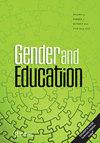How feminist knowledge is made in and beyond disciplines
IF 1.9
3区 教育学
Q2 EDUCATION & EDUCATIONAL RESEARCH
引用次数: 1
Abstract
ABSTRACT This article investigates the relationship between disciplinarity and feminist knowledge-making in Australia’s humanities and social sciences. To identify the conditions of possibility for successful feminist knowledge projects, we interpret career trajectories of senior feminist and gender researchers within five disciplines: economics, history, philosophy, politics and sociology. Feminist knowledge-making about gender occurs in every field, but it has uneven impact and status in relation to different disciplinary practices. Career trajectories are analysed to understand how feminist research is practiced within, or perhaps against or beyond, conventional disciplinarity. Strategies for feminist knowledge-making vary across and within fields. Epistemic pluralism is a key possibility condition necessary for feminist knowledge-making. In fields characterized by conceptual openness (sociology, history), feminist knowledge-making can most easily be practiced as ‘core’ disciplinary work. In disciplines characterized by epistemic closure, feminists are carving out new subfields within (economics, politics) and beyond (philosophy) their mainstream disciplinarities.女权主义知识是如何在学科内外形成的
摘要本文探讨了澳大利亚人文社会科学领域的学科性与女性主义知识创造之间的关系。为了确定成功的女权主义知识项目的可能性条件,我们解释了五个学科中高级女权主义和性别研究人员的职业轨迹:经济学、历史学、哲学、政治学和社会学。女权主义关于性别的知识制造在各个领域都有,但在不同的学科实践中,它的影响和地位参差不齐。对职业轨迹进行了分析,以了解女权主义研究是如何在传统学科范围内进行的,或者可能是反对或超越传统学科的。女权主义知识创造的策略在各个领域内各不相同。认识多元主义是女性主义知识创造的一个重要的可能性条件。在以概念开放为特征的领域(社会学、历史学),女权主义知识制造最容易作为“核心”学科工作来实践。在以认识封闭为特征的学科中,女权主义者正在其主流学科中(经济学、政治学)和(哲学)之外开辟新的子领域。
本文章由计算机程序翻译,如有差异,请以英文原文为准。
求助全文
约1分钟内获得全文
求助全文
来源期刊

Gender and Education
EDUCATION & EDUCATIONAL RESEARCH-
CiteScore
5.20
自引率
9.10%
发文量
31
期刊介绍:
Gender and Education grew out of feminist politics and a social justice agenda and is committed to developing multi-disciplinary and critical discussions of gender and education. The journal is particularly interested in the place of gender in relation to other key differences and seeks to further feminist knowledge, philosophies, theory, action and debate. The Editors are actively committed to making the journal an interactive platform that includes global perspectives on education, gender and culture. Submissions to the journal should examine and theorize the interrelated experiences of gendered subjects including women, girls, men, boys, and gender-diverse individuals. Papers should consider how gender shapes and is shaped by other social, cultural, discursive, affective and material dimensions of difference. Gender and Education expects articles to engage in feminist debate, to draw upon a range of theoretical frameworks and to go beyond simple descriptions. Education is interpreted in a broad sense to cover both formal and informal aspects, including pre-school, primary, and secondary education; families and youth cultures inside and outside schools; adult, community, further and higher education; vocational education and training; media education; and parental education.
 求助内容:
求助内容: 应助结果提醒方式:
应助结果提醒方式:


